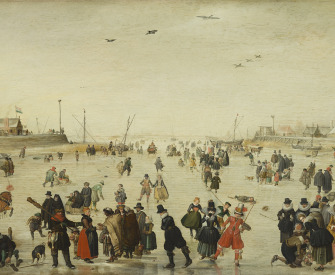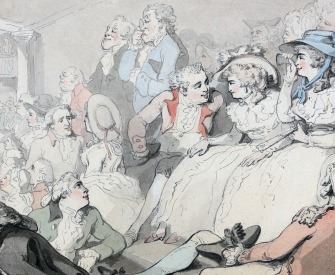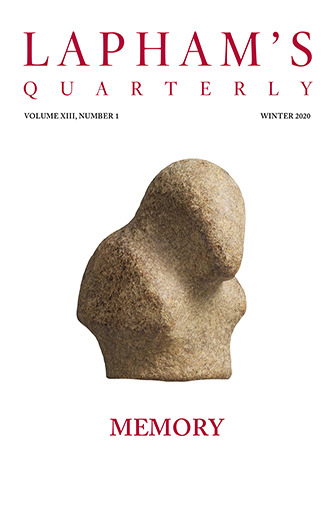There is nothing more deceptive than an obvious fact.
—Arthur Conan Doyle, 1891Gumshoe
Edgar Allan Poe trails a mark.
It was well said of a certain German book that “er lasst sich nicht lesen”—it does not permit itself to be read. There are some secrets which do not permit themselves to be told. Men die nightly in their beds, wringing the hands of ghostly confessors, and looking them piteously in the eyes—die with despair of heart and convulsion of throat, on account of the hideousness of mysteries which will not suffer themselves to be revealed. Now and then, alas, the conscience of man takes up a burden so heavy in horror that it can be thrown down only into the grave. And thus the essence of all crime is undivulged.
Not long ago, about the closing in of an evening in autumn, I sat at the large bow window of the D—— Coffee-House in London. For some months I had been ill in health, but was now convalescent and, with returning strength, found myself in one of those happy moods which are so precisely the converse of ennui—moods of the keenest appetency, when the film from the mental vision departs and the intellect, electrified, surpasses as greatly its everyday condition. Merely to breathe was enjoyment, and I derived positive pleasure even from many of the legitimate sources of pain. I felt a calm but inquisitive interest in everything. With a cigar in my mouth and a newspaper in my lap, I had been amusing myself for the greater part of the afternoon, now in poring over advertisements, now in observing the promiscuous company in the room, and now in peering through the smoky panes into the street.
At first my observations took an abstract and generalizing turn. I looked at the passengers in masses, and thought of them in their aggregate relations. Soon, however, I descended to details, and regarded with minute interest the innumerable varieties of figure, dress, air, gait, visage, and expression of countenance.
As the night deepened, so deepened to me the interest of the scene; for not only did the general character of the crowd materially alter (its gentler features retiring in the gradual withdrawal of the more orderly portion of the people, and its harsher ones coming out into bolder relief, as the late hour brought forth every species of infamy from its den), but the rays of the gas lamps, feeble at first in their struggle with the dying day, had now at length gained ascendancy, and threw over everything a fitful and garish luster.
With my brow to the glass I was thus occupied in scrutinizing the mob when suddenly there came into view a countenance (that of a decrepit old man, some sixty-five or seventy years of age)—a countenance which at once arrested and absorbed my whole attention, on account of the absolute idiosyncrasy of its expression. Anything even remotely resembling that expression I had never seen before. As I endeavored, during the brief minute of my original survey, to form some analysis of the meaning conveyed, there arose confusedly and paradoxically within my mind, the ideas of vast mental power, of caution, of penuriousness, of avarice, of coolness, of malice, of bloodthirstiness, of triumph, of merriment, of excessive terror, of intense—of supreme despair. I felt singularly aroused, startled, fascinated. “How wild a history,” I said to myself, “is written within that bosom!” Then came a craving desire to keep the man in view—to know more of him. Hurriedly putting on an overcoat, and seizing my hat and cane, I made my way into the street and pushed through the crowd in the direction which I had seen him take; for he had already disappeared. With some little difficulty I at length came within sight of him, approached, and followed him closely, yet cautiously, so as not to attract his attention.
I had now a good opportunity of examining his person. He was short in stature, very thin, and apparently very feeble. His clothes, generally, were filthy and ragged; but as he came, now and then, within the strong glare of a lamp, I perceived that his linen, although dirty, was of beautiful texture; and my vision deceived me, or, through a rent in a closely buttoned and evidently secondhand roquelaire which enveloped him, I caught a glimpse both of a diamond and of a dagger. These observations heightened my curiosity, and I resolved to follow the stranger whithersoever he should go.
It was now fully nightfall, and a thick, humid fog hung over the city, soon ending in a settled and heavy rain. This change of weather had an odd effect upon the crowd, the whole of which was at once put into new commotion, and overshadowed by a world of umbrellas. The waver, the jostle, and the hum increased in a ten-fold degree. For my own part I did not much regard the rain—the lurking of an old fever in my system rendering the moisture somewhat too dangerously pleasant. Tying a handkerchief about my mouth, I kept on. For half an hour the old man held his way with difficulty along the great thoroughfare; and I here walked close at his elbow through fear of losing sight of him. Never once turning his head to look back, he did not observe me. By and by he passed into a cross street, which, although densely filled with people, was not quite so much thronged as the main one he had quitted. Here a change in his demeanor became evident. He walked more slowly and with less object than before—more hesitatingly. He crossed and recrossed the way repeatedly, without apparent aim; and the press was still so thick that, at every such movement, I was obliged to follow him closely. The street was a narrow and long one, and his course lay within it for nearly an hour, during which the passengers had gradually diminished to about that number which is ordinarily seen at noon in Broadway near the park—so vast a difference is there between a London populace and that of the most frequented American city. A second turn brought us into a square, brilliantly lit and overflowing with life. The old manner of the stranger reappeared. His chin fell upon his breast, while his eyes rolled wildly from under his knit brows, in every direction, upon those who hemmed him in. He urged his way steadily and perseveringly. I was surprised however to find, upon his having made the circuit of the square, that he turned and retraced his steps. Still more was I astonished to see him repeat the same walk several times—once nearly detecting me as he came around with a sudden movement.

Masyaf Castle, headquarters of the Syrian branch of the Assassins, a Shiite Ismaili sect, Syria, twelfth century. © Werner Forman Archive / HIP / Art Resource, NY.
In this exercise he spent another hour, at the end of which we met with far less interruption from passengers than at first. The rain fell fast; the air grew cool; and the people were retiring to their homes. With a gesture of impatience, the wanderer passed into a bystreet comparatively deserted. Down this, some quarter of a mile long, he rushed with an activity I could not have dreamed of seeing in one so aged, and which put me to much trouble in pursuit. A few minutes brought us to a large and busy bazaar, with the localities of which the stranger appeared well acquainted, and where his original demeanor again became apparent, as he forced his way to and fro, without aim, among the host of buyers and sellers.
During the hour and a half, or thereabouts, which we passed in this place, it required much caution on my part to keep him within reach without attracting his observation. Luckily I wore a pair of caoutchouc overshoes, and could move about in perfect silence. At no moment did he see that I watched him. He entered shop after shop, priced nothing, spoke no word, and looked at all objects with a wild and vacant stare. I was now utterly amazed at his behavior, and firmly resolved that we should not part until I had satisfied myself in some measure respecting him.
A loud-toned clock struck eleven, and the company were fast deserting the bazaar. A shopkeeper, in putting up a shutter, jostled the old man, and at the instant I saw a strong shudder come over his frame. He hurried into the street, looked anxiously around him for an instant, and then ran with incredible swiftness through many crooked and peopleless lanes, until we emerged once more upon the great thoroughfare whence we had started—the street of the D—— Hotel. It no longer wore, however, the same aspect. It was still brilliant with gas; but the rain fell fiercely, and there were few persons to be seen. The stranger grew pale. He walked moodily some paces up the once populous avenue, then, with a heavy sigh, turned in the direction of the river and, plunging through a great variety of devious ways, came out, at length, in view of one of the principal theaters. It was about being closed, and the audience were thronging from the doors. I saw the old man gasp as if for breath while he threw himself amid the crowd; but I thought that the intense agony of his countenance had, in some measure, abated. His head again fell upon his breast; he appeared as I had seen him at first. I observed that he now took the course in which had gone the greater number of the audience—but, upon the whole, I was at a loss to comprehend the waywardness of his actions.
As he proceeded, the company grew more scattered, and his old uneasiness and vacillation were resumed. For some time he followed closely a party of some ten or twelve roisterers; but from this number one by one dropped off, until three only remained together, in a narrow and gloomy lane little frequented. The stranger paused and, for a moment, seemed lost in thought; then, with every mark of agitation, pursued rapidly a route which brought us to the verge of the city, amid regions very different from those we had hitherto traversed. It was the most noisome quarter of London, where everything wore the worst impress of the most deplorable poverty, and of the most desperate crime. By the dim light of an accidental lamp, tall, antique, worm-eaten, wooden tenements were seen tottering to their fall, in directions so many and capricious that scarce the semblance of a passage was discernible between them. The paving stones lay at random, displaced from their beds by the rankly growing grass. Horrible filth festered in the dammed-up gutters. The whole atmosphere teemed with desolation.
Secrets define us, they mark us, they set us apart from all the others. The secrets which we preserve provide a key to who we are, deep down.
—Nuruddin Farah, 1998The sun arose while we proceeded, and, when we had once again reached that most thronged mart of the populous town, the street of the D—— Hotel, it presented an appearance of human bustle and activity scarcely inferior to what I had seen on the evening before. And here, long, amid the momently increasing confusion, did I persist in my pursuit of the stranger. But, as usual, he walked to and fro, and during the day did not pass from out the turmoil of that street. And as the shades of the second evening came on, I grew wearied unto death and, stopping fully in front of the wanderer, gazed at him steadfastly in the face. He noticed me not but resumed his solemn walk, while I, ceasing to follow, remained absorbed in contemplation. “This old man,” I said at length, “is the type and the genius of deep crime. He refuses to be alone. He is the man of the crowd. It will be in vain to follow; for I shall learn no more of him, nor of his deeds. The worst heart of the world is a grosser book than the Hortulus animae; and perhaps it is but one of the great mercies of God that ‘er lasst sich nicht lesen.’ ”

Edgar Allan Poe
From “The Man of the Crowd.” Born in 1809, the son of two actors in Boston, Poe left the University of Virginia due to gambling debts, was expelled from West Point, obtained and then lost the editorship of the Southern Literary Messenger, and married his thirteen-year-old cousin before publishing “The Man of the Crowd” in 1840. “Poor Poe!” wrote a friend after the author’s mysterious death, likely from alcohol poisoning, in 1849. “A bright but unsteady light has been awfully quenched.”


